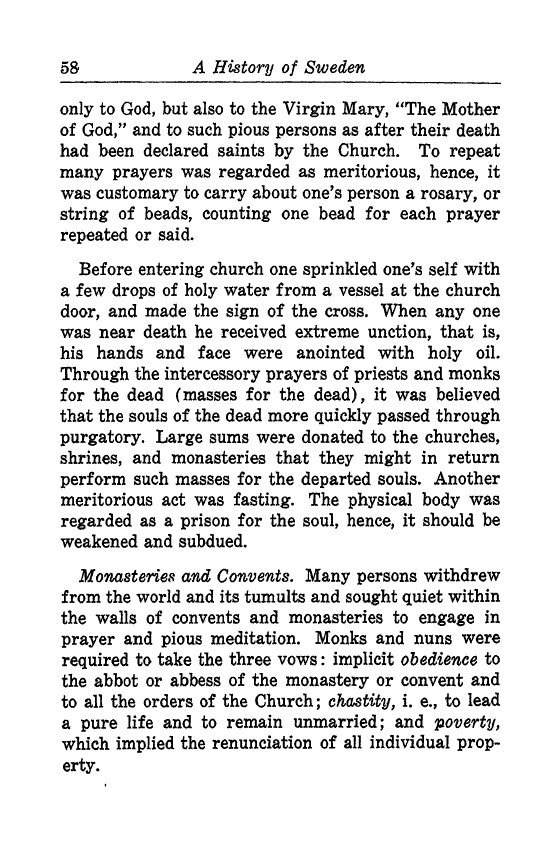
Full resolution (TIFF) - On this page / på denna sida - IV. The Early Catholic Period in Sweden - A. The Church, Its Cult and Customs

<< prev. page << föreg. sida << >> nästa sida >> next page >>
Below is the raw OCR text
from the above scanned image.
Do you see an error? Proofread the page now!
Här nedan syns maskintolkade texten från faksimilbilden ovan.
Ser du något fel? Korrekturläs sidan nu!
This page has never been proofread. / Denna sida har aldrig korrekturlästs.
58 A History of Sweden
only to God, but also to the Virgin Mary, "The Mother
of God," and to such pious persons as after their death
had been declared saints by the Church. To repeat
many prayers was regarded as meritorious, hence, it
was customary to carry about one’s person a rosary, or
string of beads, counting one bead for each prayer
repeated or said.
Before entering church one sprinkled one’s self with
a few drops of holy water from a vessel at the church
door, and made the sign of the cross. When any one
was near death he received extreme unction, that is,
his hands and face were anointed with holy oil.
Through the intercessory prayers of priests and monks
for the dead (masses for the dead), it was believed
that the souls of the dead more quickly passed through
purgatory. Large sums were donated to the churches,
shrines, and monasteries that they might in return
perform such masses for the departed souls. Another
meritorious act was fasting. The physical body was
regarded as a prison for the soul, hence, it should be
weakened and subdued.
Monasteries and Convents. Many persons withdrew
from the world and its tumults and sought quiet within
the walls of convents and monasteries to engage in
prayer and pious meditation. Monks and nuns were
required to take the three vows :
implicit obedience to
the abbot or abbess of the monastery or convent and
to all the orders of the Church ; chastity, i. e., to lead
a pure life and to remain unmarried; and poverty,
which implied the renunciation of all individual prop-
erty.
<< prev. page << föreg. sida << >> nästa sida >> next page >>